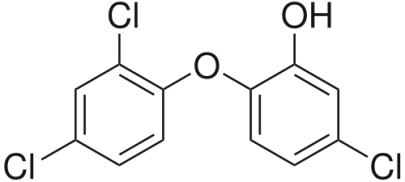Superfund Research Program

Triclosan is found in soaps, deodorants, toothpastes, shaving creams, mouth washes and cleaning supplies, and is infused into an increasing number of consumer products, such as kitchen utensils, toys, bedding, socks, and trash bags.
The days of antibacterial trash bags may be numbered. Rep. Edward Markey (D-MA) has called on the Environmental Protection Agency (EPA) to consider more stringent regulations for the antimicrobial compounds triclosan (TCS) and triclocarban (TCC). His complaint was filed partly under consideration of Superfund Research Program research demonstrating the chemicals' environmental persistence and bioaccumulation in aquatic species. In response to a request from Rep. Markey, Superfund Research Program (SRP) grant recipient Dr. Rolf Halden provided a synopsis of the state of the science as background information.
Triclosan is found in soaps, deodorants, toothpastes, shaving creams, mouth washes and cleaning supplies, and is infused into an increasing number of consumer products, such as kitchen utensils, toys, bedding, socks, and trash bags. Triclocarban is used most widely in soaps and detergents. However, the safety of both antimicrobials has been questioned in regards to environmental and human health. While the companies that manufacture products containing these chemicals claim them to be safe, the EPA is taking a closer look at the two chemicals that are registered as pesticides with the agency. Concerns are driven in part by the molecular structure of both compounds that resemble other toxic persistent chemicals, such as dioxins and PCBs. Indeed, technical grade triclosan contains trace amounts of toxic dioxins as manufacturing impurities and can be converted by heat and irradiation to form additional dioxins.
Rep. Markey, chairman of the House Energy & Commerce Committee's energy and environment subcommittee wrote a letter to EPA Administrator Lisa Jackson on Jan. 5. He indicated there may be a "strong basis" for triclosan chemicals to be tested in EPA's endocrine disruptor screening program and regulated under the Safe Drinking Water Act (SDWA).
A lot of the environmental monitoring and endocrine disruption work for triclosan and triclocarban has been done under the Superfund Research Programs (SRP) at the University of California - Davis and at Arizona State University. Dr. Halden's research demonstrates the chemicals' environmental persistence and bioaccumulation in aquatic species, whereas the UC Davis team has provided evidence for endocrine disrupting effects of TCC and TCS.
The EPA recognizes the growing body of data regarding triclosan and other persistent antimicrobial agents. The agency intends to begin its next review of triclosan's registration in 2013, ten years earlier than originally planned.


